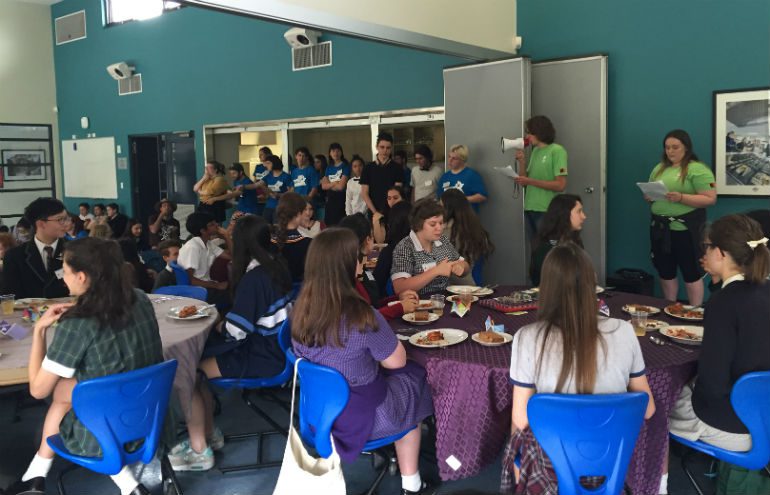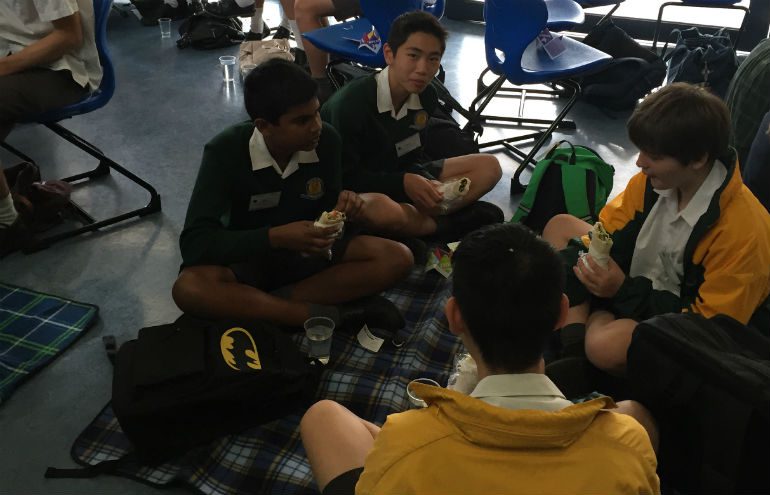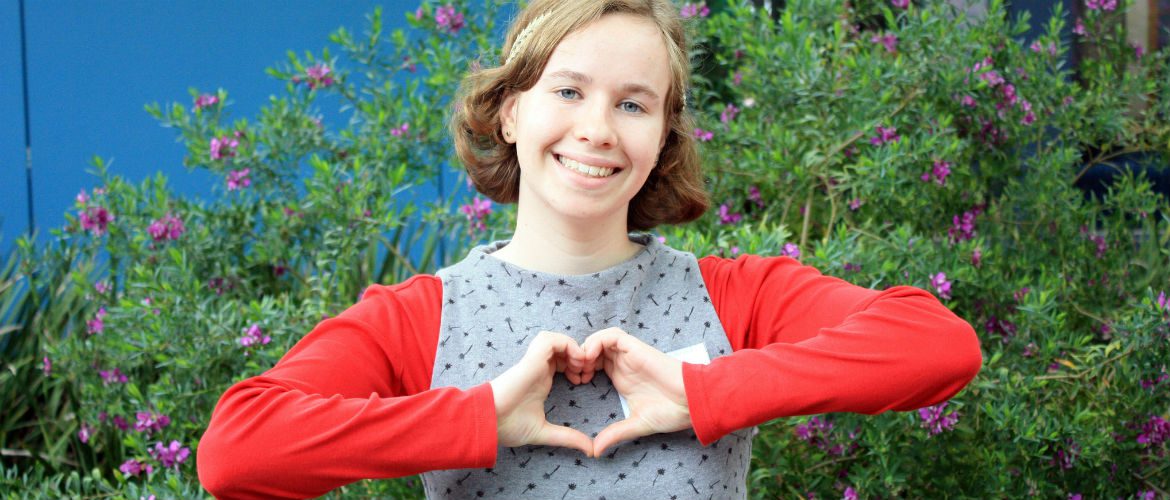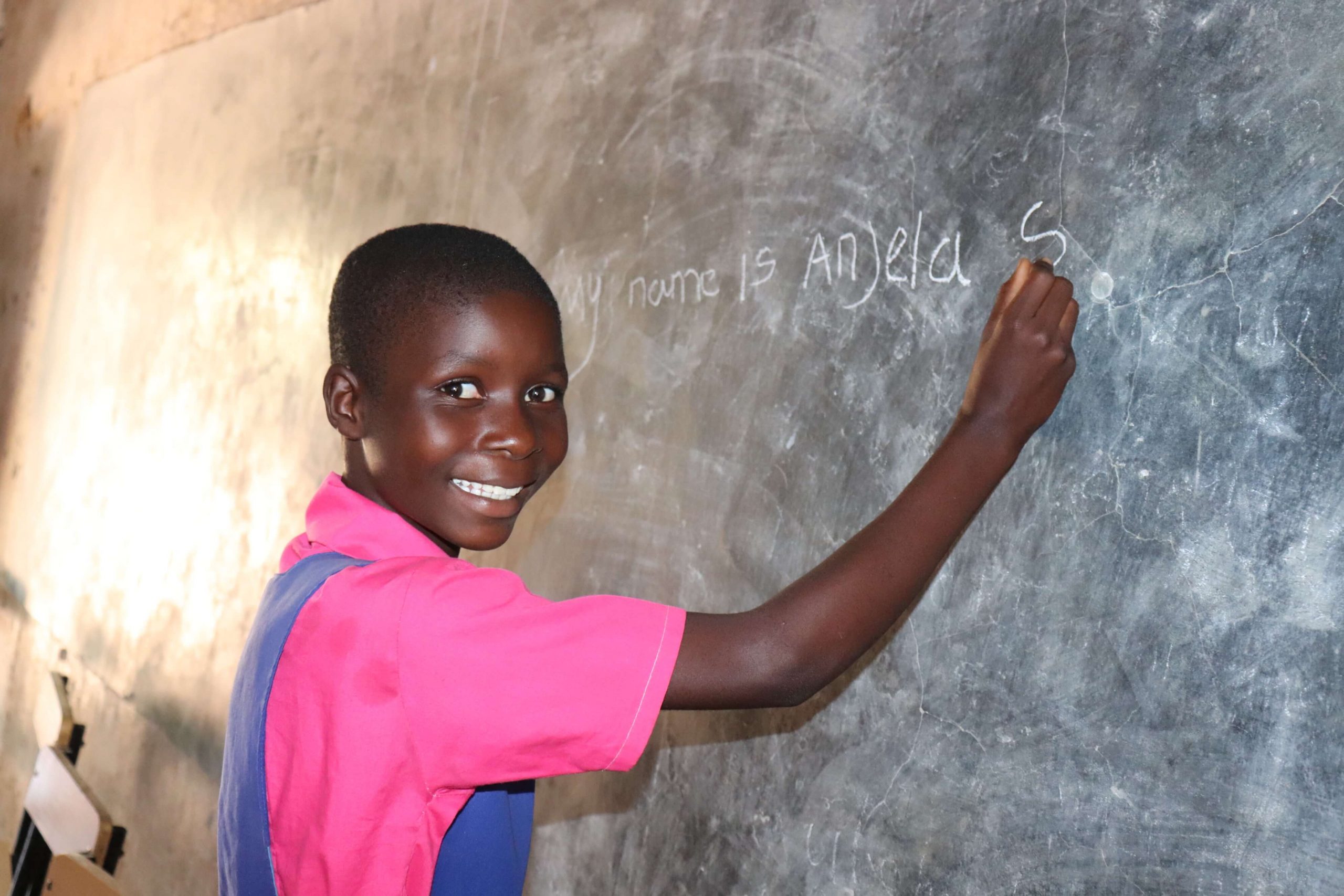Aussie students are leading the way in raising awareness of the busted food system — by teaching their classmates about how poverty and global challenges like climate change affect the health and nutrition of people in the developing world.
Take a plain bowl of rice. Perhaps some lettuce on the side. Hardly the most appetising of meals, and not likely to tickle the fancy of most Aussie school students. Yet a plain bowl of rice is the average meal consumed by the world’s poorest people each day — that’s 1.3 billion people.
In 2016, one in nine people around the world still go hungry every day. According to UNICEF, almost one in five kids under five years old in Indonesia are significantly underweight — impacting their health, development and nutrition.
In Terms 3 and 4, Oxfam is inviting students to participate in Hunger Banquets to physically demonstrate the extent of global poverty and hunger.
So how does it work?
At a Hunger Banquet, students are split into global income groups with 15% of students designated as high-income; 35% middle income; and 50% low income. Students are then fed a meal according to their social and economic status.
This creates a microcosm of the real world economy where many are hungry or starving due to poverty and inequality.
Hunger Banquets in action: Peninsula School
The Peninsula School in Victoria’s Mt. Eliza held an epic Hunger Banquet earlier this year. Year 9 students gathered in the school’s McDonald Pavilion for the student-led initiative, which involved guest speakers and a globally-representative meal.

Year 11 student leaders Nathaniel and Bec came up with the idea to host a Hunger Banquet at their school after attending one hosted by the Australian Youth Climate Coalition (AYCC) at a Climate Justice Summit.
Feeling inspired to take action themselves, Nathaniel and Bec gained approval from their school principal and school committees to run a Hunger Banquet and acted as MC’s on the day.
“We all learned about the differences in the lifestyles of people in our world, and how our country of birth can determine our life expectancy, privileges and general wellbeing,” said Nathaniel.
“Not only was this a beneficial activity for the Year 9 students, but those who hosted it had a great sense of empowerment.”
The student organisers were meticulous in their planning, ensuring the banquet was as realistic in representing the global economy as possible. The high income group received a meal of lasagne and chocolate cake at waited tables, while the middle income group received a vegetable wrap and sat on carpeted floor or chairs. The low income group were given a small meal of rice and lettuce and had to sit on the balcony of the Pavilion in the cold wind.

Male students were also served before female students to represent global gender inequality, much to the displeasure of many young girls who vocally protested this inequity. Year 7 students acted as the ‘wait staff’ for the high income group, and some took it so seriously they dressed up in penguin-style evening suits with bow ties.
Such physical representations of global inequality brought home to students how unfair our global economy and food systems are, and how poverty and hunger are issues which need addressing.
Student leadership for social change
Oxfam’s Schools Program Coordinator Kate Phillips was a guest speaker on the day, educating students on inequality and climate change, and how this relates to global hunger. Kate was particularly impressed with Nathaniel and Bec’s outstanding leadership.
“The two MC’s were total pros — you could have heard a pin drop when they gave their speeches, which they delivered with gravitas and aplomb,” said Kate.
The Peninsula School, led by Nathaniel and Bec, have shown outstanding leadership by shining a light on global poverty and hunger in their school community. As a result, these two leaders have been invited to MC a Hunger Banquet as part of this year’s AYCC Climate Justice Summit (17–18 August), of which they were participants only just last year.
“We all learned that we can make a difference; small choices in our lives such as buying Fairtrade products can have a huge impact on people in developing nations,” said Nathaniel.
“We are the upcoming generation and we are responsible for the wellbeing of everyone in our world.”
What you can do
Host a Hunger Banquet
You can follow this wonderful example and host a Hunger Banquet at your school. Many schools host their Hunger Banquets in Term 4 to coincide with World Food Day on Sunday 16 October, but banquets can be held any time during the school year.
A bowl of rice is not enough to keep people healthy and nourished. Let us not leave poverty and hunger out in the cold this winter — let’s shine a light on these pertinent issues in our schools and in our local communities.
Register for the AYCC Climate Justice Summit
You can also register to attend the AYCC Climate Justice Summit in August — spaces are limited so it’s first in, best dressed!
What: The Switched on Schools Summit is part of the Switched on Schools program. The excursion will feature change-making workshops conducted by young leaders, inspiring speakers (climate scientists, advocates and more), and planning sustainability campaigns to make meaningful change. The excursion addresses sustainability as a cross curriculum priority and covers organising ideas of systems (OI.3) world views (OI.4) and futures (OI.6, OI.7, OI.8, OI.9).
When: 8:30am–2.30pm on Wednesday 17 and Thursday 18 August 2016
Where: Trades Hall, 54 Victoria St, Carlton, Victoria, 3053
Who: Up to 30 students can attend the two-day summit.
Cost: Free
Learn more: The Australian Youth Climate Coalition is the country’s largest youth-led organisation. We believe in the power of young leaders to inspire positive change and sustainable solutions in their schools, communities and the world. In 2015 the Switched on Schools program engaged over 10,000 high school students nationally through partnerships with high schools, local government and Education for Sustainability providers. Learn more about AYCC’s approach.



